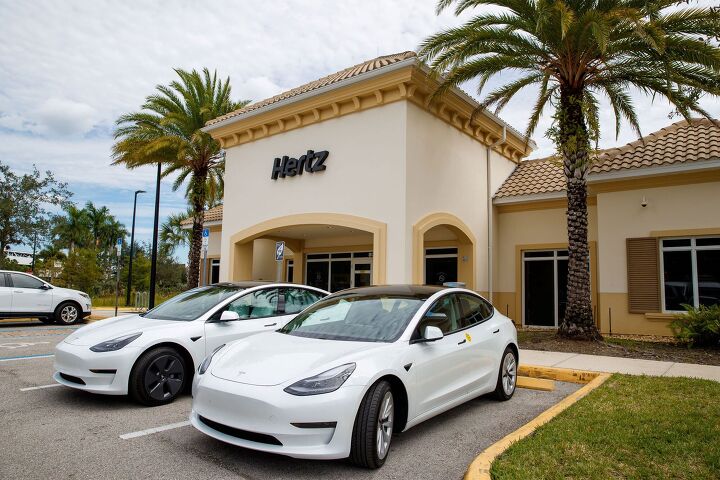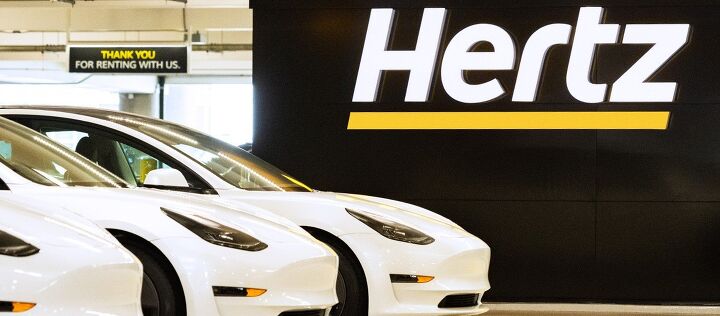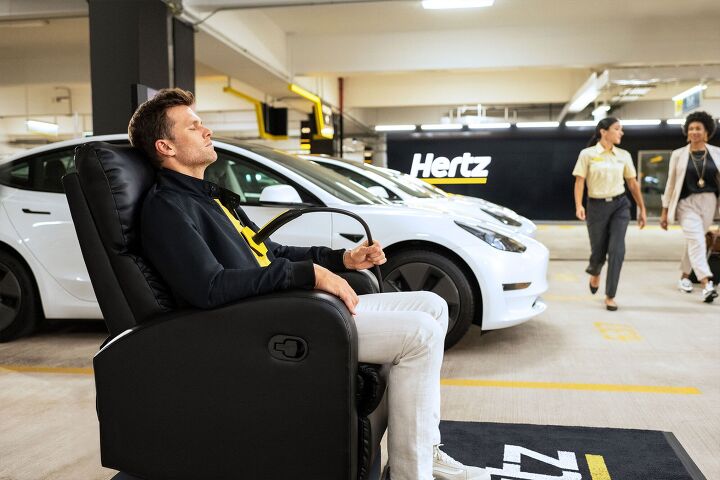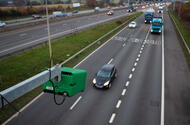If you haven’t been following Hertz, the automotive rental company filed for bankruptcy in 2020 and was purchased in June of 2021 by a hedge fund and equity firm that assumed they could run the business. A trail of disastrous decisions, including hiring Tom Brady as a brand ambassador and pivoting toward all-electric vehicles, have since shown that was not to be the case.
This is one of those things that I feel like sane people, with any knowledge of the automotive industry, could see coming from miles away. Hertz needed the rebound and its new management team spiked the ball into the ground because they didn’t understand how the game was played.
While your author has long theorized that hiring Tom Brady as a brand ambassador signals a brand’s death knell (e.g. Aston Martin), the more obvious failure was not addressing the fundamental problems with the company and thinking EVs would make good rental vehicles.
As someone who has rented a lot of cars, Hertz was always an affordable and convenient option. But their quality was on the decline for years leading up to 2020, with many of the vehicles I borrowed showing up dirty or damaged. Locations often had some of the worst service imaginable and sometimes existed as short-lived pop-up locations situated in underused strip malls. I once had to wait over an hour on a Hertz vehicle I was returning to a Manhattan parking garage and ultimately decided to check the vehicle in myself on the requisite forms. The employees were too busy fighting with customers hoping to pick something up.
Other times things went smoothly. But the staffing issues reflected the management problem and Hertz Global Holdings’ new owners decided that an aggressive marketing campaign where a football star told you about all-electric cars was more important than making sure its storefronts functioned properly.
Hertz foolishly bet the farm on vehicles where the primary benefit is being able to charge them conveniently at home as part of your normal weekly routine. Handing EVs to a customer base that was unlikely to be able to charge their vehicles overnight and would undoubtedly be driving more miles than the daily commute would warrant was, frankly, one of the worst ideas I’ve heard in a while.
While the pandemic is often cited as the primary reason Hertz Global Holdings originally went under, the timing suggests that there were other factors at play. Rumors that the company would be filing for Chapter 11 existed prior to missing lease payments on its fleet in April of 2020. The year was admittedly brutal on all companies renting cars. Hertz just went into the situation in rougher shape and ended up failing to navigate the situation.
The primary issue was that Hertz has taken out loans backed by its own fleet. When the value of those vehicles cratered during a period where nobody was buying vehicles due to lockdowns, the company was basically doomed. However, the bizarre nature of the situation made it appetizing to investors who could now buy up shares for practically nothing. Its share price became extremely volatile and encouraged massive valuation spikes and falls on an almost monthly basis.
Despite securing the necessary funding to continue existing and fresh management, the company’s share price has been on a downward trend since November 2021. That was immediately after Hertz managed to accrue $1.3 billion via an initial public offering. At the time, it was seen as a momentous comeback fielded by experts in the realm of finance. Bloomberg even went out of its way to describe the elite ultra-elite social gathering celebrating the event in its coverage.
The assumption was that Knighthead Capital Management and Certares Management had saved the company and were about to make oodles of money bringing it back from the brink. However, the subsequent reality was quite different.

Knighthead Capital founder Tom Wagner is on record saying that all-electric vehicles would be an excellent way to reposition Hertz in the rental market and was backed by his counterpart at Centares (Greg O’Hara). The duo were already convinced that electrification would soon replace combustion engines and viewed themselves as on the cutting edge. Market analysts were consulted prior to the decision and the EV angle became a major aspect of its investment pitch.
From Bloomberg:
Hertz’s new owners were making a fully charged bet to swap Hertz’s gas-powered rental-car fleet for EVs. The company announced an unprecedented order for 100,000 Teslas and struck an exclusive deal to supply EVs to Uber drivers. It planned to build out a national, and eventually global, charging network at Hertz’s thousands of locations, with ambitions to become the service manager for the autonomous-driving era. Wagner was also ski buddies with Brady, then quarterback of the Tampa Bay Buccaneers, and persuaded him to be its new celebrity frontman. Brady, who in his prime joked that he was the slowest man in the NFL, would show, in Hertz’s words, that the company “is making EV rentals fast”—a play on the company’s 1970s commercials, with O.J. Simpson vaulting down staircases touting “The superstar in rent-a-car.”
It was a pitch-perfect strategy for an economy just rebounding from the pandemic, seizing on America’s newfound love for travel, the public’s fascination with Elon Musk and the stock market’s willingness to throw money at anything with an EV story. The November IPO valued Hertz at $15.3 billion, more than two-and-a-half times the $5.9 billion Wagner and O’Hara had paid to buy it out of bankruptcy. With demand for car rentals surging and cash flowing in, the company authorized a $2 billion stock buyback. Soon, Hertz would announce that Stephen Scherr, the recently retired chief financial officer at Goldman Sachs Group Inc., was joining to lead its EV transformation as chief executive officer.
It wouldn’t be long until the Teslas and would see deep discounts, primarily because they simply didn’t work well as rental vehicles. Meanwhile, the manufacturer had significantly reduced the price of its products shortly after Hertz had just bought 100,000 units — creating a repeat of what happened with its fleet valuation and share price in 2020.
While the company believed it could get out ahead of the competition, the reality was that it was digging its own grave. Bloomberg goes into great detail about how an out-of-touch executive class was utterly convinced that they were ushering in an entirely new way of renting an automobile. Management was positive Certares could solve Hertz software and cloud issues while likewise integrating the many travel agencies it owned into novel money making ventures. Leadership simultaneously touted a keyless future where customers could simply use their phone to locate, unlock, and then drive rental vehicles away. Hertz was even renting EVs to Uber drivers as part of a new partnership program.
There was a lot going on at the time.
But the above ignores the fundamental problems the company was already facing and didn’t make all-electric vehicles any easier for people on vacation to use. The fact of the matter is that not all trips or parts of the country actually work with EVs. Whether on business or pleasure, absolutely nobody wants to take time out of their itinerary to charge an electric car. However, they’re effectively forced to when they’re renting since they cannot charge at home.
It turned out that just getting the EVs into the right regions was a tall order for the company. Many places saw extremely low demand for Tesla and Polestar vehicles, with customers refusing to take them since they didn’t want to go out of their way to charge them. But the places where they became popular likewise became problematic, as customers would often return them low on battery power. Locations often did not have enough charging stations present to ensure the vehicles would be ready for the following day — enraging the limited number of renters who actually wanted an EV.
Tesla rentals were also involved in more accidents (per capita) because those new to all-electric vehicles weren’t familiar with how they operated. Peppy cars that the company originally thought saved them on long-term maintenance (e.g. oil changes) ended up costing more because the repairs were so much more costly and common.
At the same time, the management and software issues Hertz had previously been struggling with worsened. Customers continued having issues procuring the vehicles they had reserved and some that were returned were shown in internal databases as missing. This led to hundreds of people being arrested for cars they never stole. As you might have imagined, this turned into a class action lawsuit that Hertz settled for $168 million in 2022.
Hertz started aggressively downsizing in 2024. But we were already arguing that the writing was on the wall for Hertz. The company had only purchased about half the EVs it said it would in 2022 and the mounting customer feedback was getting truly ugly.
As enjoyable as it is to see a bunch of self-absorbed, financial bigwigs absolutely blow it at Hertz, we should remember that these decisions affect real people. The employees of these companies suffer because the people running them aren’t nearly as smart as they like to pretend.

[Images: Hertz]
Become a TTAC insider. Get the latest news, features, TTAC takes, and everything else that gets to the truth about cars first by subscribing to our newsletter.
Source: The Truth About Cars


